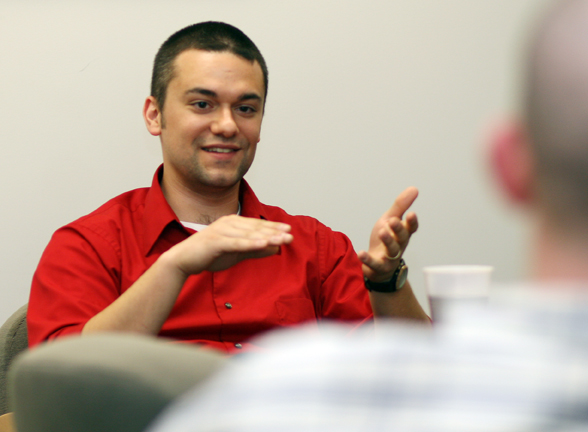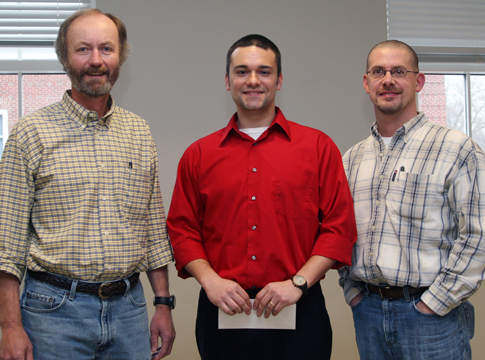 St. Jude’s Children’s Hospital Research Associate Nick Negovetich ’01 felt honored Thursday to present his graduate work to students and his former professors. But he never expected to be honored so literally.
St. Jude’s Children’s Hospital Research Associate Nick Negovetich ’01 felt honored Thursday to present his graduate work to students and his former professors. But he never expected to be honored so literally.
"I was shocked," Negovetich said of the moment Professor of Biology David Krohne announced that the 29-year-old scientist now studying avian influenza at St. Jude's had been named winner of the Thomas Cole Alumni Research Prize. The cash prize honors long-time Wabash biology Professor Tom Cole ’58 and his encouragement of research by Wabash graduates.
"I think this prize is really a reflection of the Wabash faculty," Negovetich said. "My being recognized as having done high quality research in graduate school really reflects well on them. They provided the training. They set the foundation."
Negovetich received the award following a talk on the research he had conducted as a graduate student at Wake Forest University. The presentation focused on his study of trematode infestations of snails and his findings that suggested such infestations should be successful and safe in controlling the populations of snails that are carriers of the parasite that causes schistosomiasis, a disease suffered by more than 200 million people worldwide. Negovetich was the first to apply matrix population modeling to snails, and two papers from that research are being published in The Journal of Parasitology. Those who have read the papers have told the young scientist they'll be very well received.
That didn't stop Negovetich from being apprehensive about presenting his work to his former professors.
"I was really nervous," he admitted after the talk. "I'd look over and see Professor [Eric] Wetzel scribbling down notes, and I'd wonder what he was writing, what he was going to ask me."
Negovetich's former advisor, Wetzel also recommended him to Richard Esch, his own former graduate school advisor at Wake Forest, when Negovetich applied there.
"Nick's been doing significant research, and he's been on a short list of alumni for the Cole Prize for a while," Wetzel said. "I'm glad we were able to award it to him this year."
For last eight months, Negovetich has worked under the supervision of Dr. Robert Webster, one of the world’s leading experts on avian influenza, at St. Jude's Children’s Research Hospital. The move from snail studies to front-line bird flu research is unusual, but shows the agility typical of liberal arts science grads.
"In a liberal arts science education you're not just taking biology, I had all kinds of course outside of my major, and with that kind of background allows me to work with snail parasites at one place, then move to virology at the next," Negovetich said. "I'm willing to give it a chance, to see if it interests me. By being broadly trained, you should have an easy time jumping from one field to the next."
"I had heard from a post-doc at St. Jude that there might be an opportunity in ecology there," Negovetich explained. "Most ecologists wouldn't think of contacting a medical center, but I contacted them, said I wanted to learn some molecular techniques, and asked if there was any place they might use me. They told me about the avian influenza project, we started talking about transmission of the disease, and they invited me to come up and work there."
Negovetich's research now focuses how the HN5 virus survives in water outside of its hosts, a key to understanding how it is spread from bird to bird and where the virus comes from.
"There's a question of where the H5N1 virus is. It just appears in outbreaks. But where does it come from? where is it's hiding place. do wild birds hold the virus? It's an economic question, as well."
In addition to his own work, Negovetich attends weekly seminars where he hears from other scientists in Webster's team studying all aspects of the virus. He believes all that he's learning there is an important step to his long-term goal.
 "I'm trying to build my career," the 2008 Cole Alumni Prize winner explained. "I want to come back and teach at a small college, like Wabash. I'd like to continue to do research, too."
"I'm trying to build my career," the 2008 Cole Alumni Prize winner explained. "I want to come back and teach at a small college, like Wabash. I'd like to continue to do research, too."
Negovetich has fond memories of his Wabash days. And a painful one, too. One of his best-remembered moments as a student came during an immersion trip to Jamaica with Professor Eric Wetzel’s invertebrates class. Negovetich was "bit," not once, but twice by an octopus. (Read about Nick and the octopus here.)
The experience didn’t faze the young biologist. In fact, that trip provided an even more defining moment of his Wabash days and a clue to the direction and passion with which he would pursue a career in science.
"A bunch of the guys were going into town one afternoon, and I had the choice of going with them, or going out to the barrier reef with Dr. Wetzel and snorkeling," Negovetich recalled. He chose the latter, and spent hours at the reef, amazed by what he observed.
"The current was pushing us around, but we saw these huge rays—and an eagle ray—moving through it effortlessly," he said. "I was always glad I made that decision, that Dr. Wetzel gave me that opportunity. I knew I’d always have a chance to go to town and be a tourist. But to dive on a barrier reef—this was my one chance, and I was going to get out of it everything that I could."
In photos: (above) Negovetich catches up with his former advisor, Professor Eric Wetzel; receiving the Thomas Cole Alumni Research Prize from Professors David Krohne and Eric Wetzel.